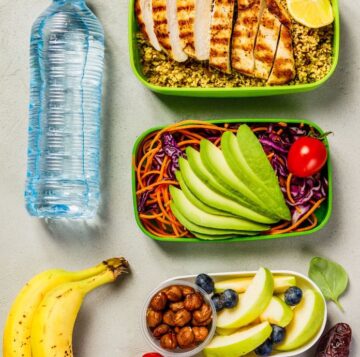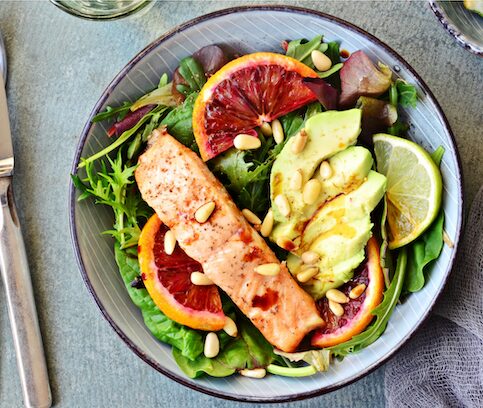Properly fueling your body helps you achieve your goals!
I often see similar patterns during an initial consultation with clients about their nutrition. Many under eat to a significant degree, are highly stressed, use caffeine as their crutch to get through the day and then struggle with poor sleep and poor recovery.

For many, the idea of adding fitness to their already hectic routine seems daunting and so far away from what they seem to have energy for.
The truth is that fitness, nutrition and lifestyle go hand in hand and DON’T HAVE TO BE COMPLICATED to get the results you want. Where people get caught up in ruts, is listening to 25 different opinions on what or how they should eat…
- Reduce calories to lose weight
- Cut out carbs
- Go Keto
- Eat only meat
- Go plant based to save the planet
- Intermittent fasting is the answer
The first question we have to ask is, how do you know if you’re feeding yourself with enough food throughout the day?
To know this, we first need to know something about your body composition, namely; Lean Body Mass (“LBM”). To find this, take your body weight and divide by 2.2, this will give you your estimated LBM in kilograms (kg’s). To find the the range of calories you should be consuming on a daily basis, also known as our Total Energy Expenditure (“TEE”), take your weight in kilos and multiply it by 25 – 35, this gives us a low end and high end of range. This is a method that I have used on many clients and gives us an excellent place to start when working on their nutrition. Where we settle on within this range, and what macros we choose to go with, will be largely based on our activity level throughout the day/week, where your current state of health lies and what your ultimate goals are with fitness and nutrition.
For example, a 40yr old, 220lb healthy male, has a LBM of 100kg. If we multiply that by 25, we get 2,500, then 35, we get 3,500. So, our range of potential caloric intake for this individual is between 2,500-3,500 calories per day. Let’s assume this male is fairly active and works out 3-4x per week. Without getting into the nitty gritty of this individuals macronutrient profile (aka fuel), we could assume that he will be somewhere on the higher end of this spectrum depending on how intense his workouts are. But at a minimum, we should assume that getting 2,500cal per day is his norm to sustain his activity levels and fueling his body with what it needs to thrive.

The concepts that I have spoken about above are where your consistency can help keep you properly fed throughout the day. Putting good principles into practice isn’t difficult and can be something like the following:
- Eating 3 solid meals per day
- Taking 3 deep breaths before each meal to aide digestion
- Protein should be the size of your fist, per meal
- Carbohydrates the size of your palm (maybe more depending on your TEE), per meal
- Fats should be roughly the size of your thumb, per meal
Of course, that isn’t an extensive list of all of the principles you could follow, rather a sampling that can give you an idea of how you could apply these on a daily basis to ensure that you DO get enough food.
What Are Some Of The Dangers Associated With Undereating On A Consistent Basis?
l for starters, what are we considering to be “undereating”? We’re talking 500 or more calories per day. On the extreme, we’re talking 800-1000 per day. The body can’t see your outside environment, it doesn’t know if you’re working out, in traffic or running from a tiger; stress on the system is stress on the system. The body can only react to what is coming in and how it can maintain homeostasis. When it doesn’t get enough food, the body has to shift priority from using its available calorie storage for whatever demands are put on the system to burning less calories and using only what’s necessary for survival. Your body will store the calories it does take in, as fat, to make sure you stay alive!
The end result is that even if you’re working out harder, you’ll continue to maintain body fat. Why is this? Physiologically, your thyroid hormone production gets reduced, sex hormone production virtually stops and wildly raises your adrenal stress hormones like cortisol. Prolonged elevated cortisol production will lead to both leptin and insulin resistance. This then can lead to an unhealthy hormonal state that can be hard to recover from and have long term health effects if not corrected.

To put it bluntly, you will give yourself diabetes, put crazy stress on your endocrine system, your heart and your ability to recover from stress.
Therefore, it should come as no surprise that those that are successful with a busy lifestyle, but also are able to stay fit, are those that have a good handle on their nutrition and caloric intake. They might not know exactly to a tea the total number of calories they consume per day, but they have developed good sound principles when it comes to food, how much and hard they workout and things they do to recover from their daily stressors.
The above information is not intended to diagnose or treat a disease and is not a substitute for appropriate medical care.
Learn more about Naturopathic Medicine and much more in our other blog posts.
We add a new article each month. So sign up to our newsletter to stay up to date.








